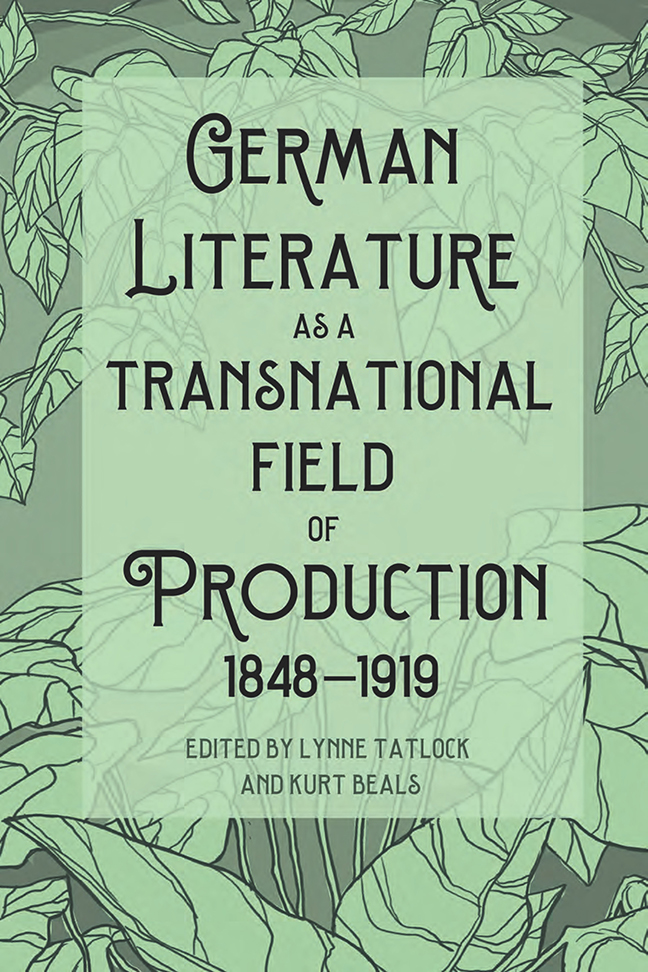Book contents
- Frontmatter
- Contents
- Acknowledgments
- Introduction: A Transnational Literary Field in the Age of Nationalism
- 1 The Passion of Johannes Scherr: Historiography as Trauma
- 2 Between Integration and Differentiation: On the Relationship between German and Austrian Literature in the Second Half of the Nineteenth Century
- 3 Reading Stifter in America
- 4 Travel Writing and Transnational Marketing: How Ida Pfeiffer brought the World to Austria and Beyond
- 5 Ernst Brausewetter's Meisternovellen Deutscher Frauen (1897–98): Gender, Genre, and (Inter)National Aspiration
- 6 Arbiter of Nation? The Strange Case of Hans Müller-Casenov's The Humour of Germany (1892/1893)
- 7 Visualizing the End: Nation, Empire, and Neo-Roman Mimesis in Keller and Fontane
- 8 Eurocentric Cosmopolitanism in Thomas Mann's Buddenbrooks
- 9 European Peace from a Transatlantic Perspective: Victor Hugo and Bertha von Suttner
- 10 Hermann Graf Keyserling and Gu Hongming’s Ethics of World Culture: Confucianism, Monarchism, and Anti-Colonialism
- 11 Constructing Symphonic Worlds: Gustav Mahler, Weltliteratur, and the Musical Program
- 12 The Garb of National Literature: Transnational Identities and the Early Twentieth-Century Schriftstreit
- 13 From European Symbolism to German Gesture: The International and Transnational Nationalism of Stefan George's Blätter für die Kunst
- 14 Canon Fire: Dada's Attack on National Literature
- Selected Bibliography
- Contributors
- Index
2 - Between Integration and Differentiation: On the Relationship between German and Austrian Literature in the Second Half of the Nineteenth Century
Published online by Cambridge University Press: 10 January 2024
- Frontmatter
- Contents
- Acknowledgments
- Introduction: A Transnational Literary Field in the Age of Nationalism
- 1 The Passion of Johannes Scherr: Historiography as Trauma
- 2 Between Integration and Differentiation: On the Relationship between German and Austrian Literature in the Second Half of the Nineteenth Century
- 3 Reading Stifter in America
- 4 Travel Writing and Transnational Marketing: How Ida Pfeiffer brought the World to Austria and Beyond
- 5 Ernst Brausewetter's Meisternovellen Deutscher Frauen (1897–98): Gender, Genre, and (Inter)National Aspiration
- 6 Arbiter of Nation? The Strange Case of Hans Müller-Casenov's The Humour of Germany (1892/1893)
- 7 Visualizing the End: Nation, Empire, and Neo-Roman Mimesis in Keller and Fontane
- 8 Eurocentric Cosmopolitanism in Thomas Mann's Buddenbrooks
- 9 European Peace from a Transatlantic Perspective: Victor Hugo and Bertha von Suttner
- 10 Hermann Graf Keyserling and Gu Hongming’s Ethics of World Culture: Confucianism, Monarchism, and Anti-Colonialism
- 11 Constructing Symphonic Worlds: Gustav Mahler, Weltliteratur, and the Musical Program
- 12 The Garb of National Literature: Transnational Identities and the Early Twentieth-Century Schriftstreit
- 13 From European Symbolism to German Gesture: The International and Transnational Nationalism of Stefan George's Blätter für die Kunst
- 14 Canon Fire: Dada's Attack on National Literature
- Selected Bibliography
- Contributors
- Index
Summary
This essay will consider arguments for and against the integration of Austrian into German literature, with special reference to the perspective of the agents in the nineteenth-century literary field. The focus will be on the Austrian side, since the German view of the question as to how to deal with Austrian literature was generally quite simple: “War sie erfolgreich, wurde sie mit größter Selbstverständlichkeit und ausschließlich als ‘deutsche’ Literatur akzeptiert—oder aber ignoriert” (If it was successful, it was exclusively and without much ceremony accepted as “German literature”—or ignored). With reference to Pierre Bourdieu's theory of the literary field, the key question of integration or differentiation can be reformulated more provocatively: did an independent Austrian literary field exist? In the following attempt to answer this question, we will examine the positioning of literary works by their authors, publishers, critics, and literary institutions, as well as local book production and distribution.
Austro-German politics of the period—in Bourdieusian terms, the field of power—exerted an important influence on the cultural situation in Austria. In the Vormärz (pre-1848) era, the Austrian government sought to maintain its authority in the German Confederation, but at the same time resisted the attempts of the liberal and national opposition to unite the German-speaking lands of the monarchy with a constitutional German state. Such a union would clearly have destroyed the monarchy. Thus, Metternich wrote in papers found in his estate: “Ohne in sich selbst zu zerfallen, kann Österreich in dem deutschen Wesen nicht aufgehen, und sollte es infolge eines solchen Zerfallens seine deutschen Theile diesem Gemeinwesen preisgeben, so würde das weit kräftigere Preußenthum die Erbschaft für sich in Empfang zu nehmen wissen” (Austria cannot be submerged in a German entity without collapsing into pieces; and if as a consequence of such a disintegration it should surrender the Germanspeaking parts of Austria, mighty Prussianism would gladly lay claim to the [German] cultural inheritance).
After 1848, the centripetal and centrifugal forces in the monarchy remained balanced for some time; even the German nationalists in Austria had been disappointed by the Frankfurt parliament. Absorption into a German Empire under Prussian leadership no longer seemed particularly attractive under the circumstances. Military defeats, economic deficits, and a relatively late development towards modernity were compensated for by a growing Austrian national consciousness.
Information
- Type
- Chapter
- Information
- Publisher: Boydell & BrewerPrint publication year: 2023
